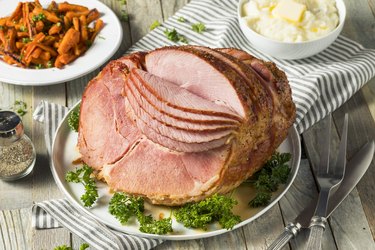
Spring is when many of us blossom — the days start getting longer, the weather is warmer and the sun is brighter. But all the things that make the season so great can also sometimes be causes of spring weight gain.
While you might be used to gaining some weight in the winter, you may be less aware of how the pounds may sneak up on you during the spring.
Video of the Day
Video of the Day
Just know that, in general, a little weight gain is normal every now and then, in any season. But if you want to enjoy the sunshine and social activities spring brings without worrying about putting on a pound or two, get to know the biggest spring weight gain pitfalls so you can avoid them.
1. Holiday Eating
Winter isn't the only season for holiday celebrations that center around food. Spring holidays are also a time where many people gather with their loved ones to eat and drink. And it can be hard to stay mindful of how much you're eating when you're focused on being festive.
"Spring contains holidays like Easter, Passover, St. Patrick's Day and Cinco de Mayo, all food-centered holidays," says registered dietitian Meghan Pendleton, RD. "And the latter two are also alcohol-centered, all of which makes it easy to consume more energy than our bodies need, through energy-dense foods and beverages."
How to Avoid Overeating During Spring Holidays
Pendleton says the key to not overdoing it during spring festivities is to focus on mindful eating and drinking — not restriction. To help you celebrate the holidays mindfully, Pendleton recommends the following strategies:
- Collaborate on the menu: For a potluck with friends or a family gathering, talk to the host about what kind of food will be served, so you know if the menu includes some healthy options. If it doesn't, you can bring a nutritious dish and still eat what's being served in a balanced way. Collaborating on the menu also gives you a chance to communicate any boundaries around food and weight that you might have.
- Don't restrict your eating: Vowing not to eat certain foods, can do more harm than good. "A heavy focus on restriction can actually make us more preoccupied with food, increase our perceived palatability of food and decrease our feelings of satiety — which can all lead to overeating," Pendleton says.
- Enjoy cultural foods: Eating mindfully during the holidays means allowing yourself to enjoy cultural and traditional foods.
2. Daylight Saving Time
Who doesn't love an extra hour of sunlight? While more daylight is great, in addition to affecting your sleep, daylight saving time could also bring about changes in appetite. "The time change brings more daylight, and so since we're awake for longer, we may be more inclined to eat more," Pendleton says.
Some research has found a link between sleep deprivation and increased eating, per the Harvard T.H. Chan School of Public Health. The loss of an hour of rest that comes with the start of daylight saving time could result in you feeling hungrier and eating more.
The researchers behind an August 2013 study in Nature Communications found an association between sleep deprivation and an increased risk of obesity, because it's possible for sleep deprivation to alter the hormones that regulate our appetite and lead to increased eating.
How to Get More Sleep During Daylight Saving Time
It's important to establish and keep healthy sleep habits, especially during the time change that comes with the spring. Here are some habits that can help you get good sleep this season, per the Cleveland Clinic:
- Slow your body down before bed: Raising your body's core temperature before bed can make it harder to rest, so avoid heavy workouts before bed.
- Put away your electronics: The light from your devices can hinder the production of melatonin, the sleep-inducing hormone. Tuck away your phone or tablet at least an hour before bed and opt for a book or meditation instead.
- Be consistent: Try to get the same amount of sleep each night.
- Reserve your bed for sleep: Try to avoid working from your bed during the day, which could make it harder to fall asleep at night.
3. Stress
The spring can bring a lot of joy, but it may also bring some stress. You could feel pressure to accept every invitation to be social, for example, and the coronavirus pandemic may have left you with lingering anxiety about being in crowds or in close quarters in general.
And when you're stressed, you may look to food for comfort. Being in physical or emotional distress can also make you more likely to crave foods that are high in fat and sugar, per Harvard Health Publishing. And stress-eating could lead to weight gain over time.
Finding ways to de-stress that don't revolve around food can help keep weight gain at bay.
How to Manage Stress During the Spring
Some ways to manage stress, per Harvard Health Publishing, include:
- Meditation techniques: Mindfulness meditation, in particular can help you make more mindful food choices.
- Exercise: Exercises like yoga offer a meditation component.
- Social support: Adequate social support may help you beat stress. Turning to friends who understand your spring-related stress may be especially helpful.
- Rush University System for Health: "Unexplained Weight Changes"
- Harvard T.H. Chan School of Public Health: "Sleep"
- Nature Communications: "The impact of sleep deprivation on food desire in the human brain"
- Cleveland Clinic: "Daylight Saving Time: 4 Tips to Help Your Body Adjust"
- Harvard Health Publishing: "Why stress causes people to overeat"